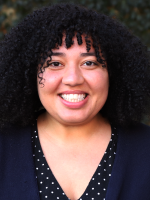Faten, a 34-year-old Metro Detroit mother who's been wearing a hijab for more than 20 years, says she always felt safe wearing the head covering — until now.
Faten asked Michigan Radio to withhold her last name, fearing for her security after a Farmington Hills man was arrested for allegedly calling on people to "hunt Palestinians."
When Faten started wearing a hijab at 11, she said, it was a celebration. She and her friend threw a party to commemorate the occasion.
And she’s been proud to wear it ever since — especially in Metro Detroit, home to some of the largest populations of Muslims in the country, where she is constantly surrounded by others in hijab.
Now, she's talking to her young daughter about why she might face hate for wearing the expression of their faith.
"I had to explain to her why people could potentially be targeting us only because they're going to see the hijab and they're going to just act. And unfortunately, that's just the kind of world we live in," said Faten.
Faten says she's never felt like this in her life — not during 9/11 when she was a 12-year-old, just a year into wearing her hijab. Not during any other conflict.
She says she's worried for the people back home, how they’re finding food and water, how they’re staying safe. She can’t stop thinking about the videos and images of children she’s seen. She describes children having surgery without anesthetics, mothers begging for their children, children begging for their mothers.
She’s had nightmares this past month. Her daughter has too. Faten says she's anxious all the time, trying to figure out what she can do to help. She’s attended rallies, stayed up on the news she doesn’t usually watch, talked to this reporter.
“There are times where I feel like what you know, does any of this even matter? My regular daily life, like with lives on the line, there are people dying by the second and I'm just sitting here typing away,” Faten said.
She also has family in Gaza. Faten says they're still alive, but it's been hard to keep in touch with them because Israel sometimes cuts off access to phone and internet lines. She says she's "glued" to the news on Al Jazeera, hoping to catch updates that would help her know her family is still safe.
“I'm just waiting to hear certain names because every now and then they'll announce, like, whenever an airstrike hits an entire building and annihilates an entire generation, entire bloodline. They typically announce the family name if they can,” Faten said.
“And so I'm just on edge, just hoping to God I don't hear our family name, But even then, I've heard family friends' names. And that's even — that's just as scary, to know that it's that close to home. It's like I know people that live in the area, that have family there, and they probably just heard their own family name on the news. And that's mortifying.”
More than 10,000 Palestinians have died over the last month of violence, according to the Palestinian Ministry of Health. The ministry says most of those deaths have been women and children.
Israel says it’s defending itself against terrorism by striking Hamas deep within the densely populated Gaza Strip, home to more than 2 million people.
And Faten says Israel's actions have changed what she was planning on telling her daughter about what it means to be Palestinian.
Like many families across the Palestinian diaspora, Faten has heard stories of a Palestine she’s never seen.
She says her family is not originally from Gaza. They’re from Hebron, in the West Bank — another part of Palestine separated from Gaza by Israel. Faten says her family was pushed out by the settlement of Israel, and moved to Gaza and Egypt around 1948.
She’s heard stories about the olive trees — a source of income, but also a symbol of Palestinian resistance, because the trees are drought-resistant and grow under poor conditions.
And the Dome of the Rock shrine in Jerusalem: “There's a whole historical background and an Islamic background there," Faten says. "That's, you know, a big part of our religion. And that's not something we're supposed to give up as a people. We've been charged with protecting that."
That’s what Faten was planning on telling her 8-year-old daughter: Being Palestinian means honoring and protecting their faith and their traditions — not that people might want to hurt her because of her religion or what she wears. And not how to stay safe if people do want to hurt her.
But she says her daughter understands the danger.
“She's like, 'Yeah, you're right. Because when I'm with Baba, they're not going to know that we're Muslim because he doesn't wear a hijab.' I'm like, 'Yeah, exactly.' I'm like, 'So when you're with me, we have to be extra careful,'” Faten said.
“And now that she has to know that, she's aware of what's going on in the world. I felt like some of her innocence was taken away. And that breaks my heart. I didn't want to have to do that," Faten said.
She says she told her daughter, "I've got to know that you'll be vigilant, that you'll run if I run."



